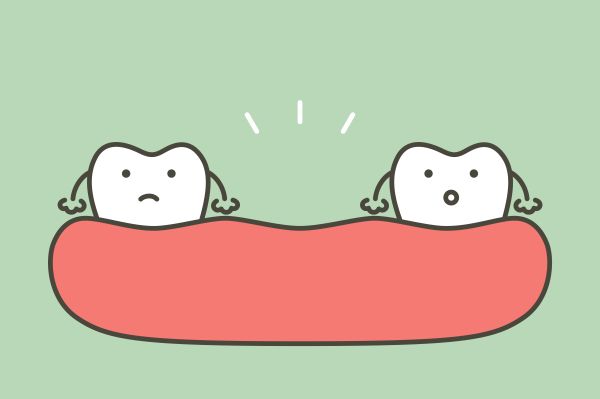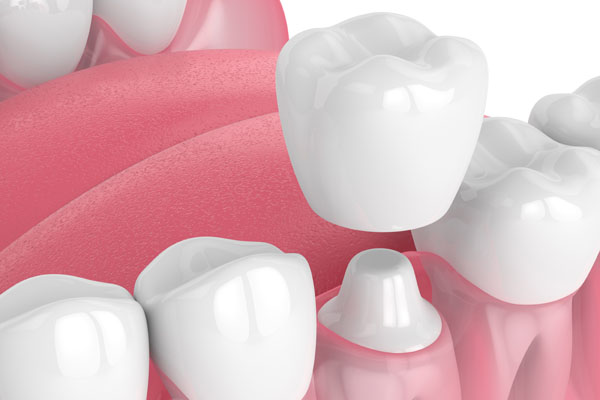Why a Missing Tooth Is Harmful to Your Dental Health

A missing tooth may occur as the result of an injury, tooth decay or gum disease. According to the American College of Prosthodontists, as many as 178 million Americans have lost at least one permanent tooth. If not replaced, the gap left behind can have several detrimental consequences on oral health and functionality.
Dental complications
An incomplete smile often makes people self-conscious, but many elect to not seek treatment because it is not seen as an urgent issue. However, teeth support the structure of the face and just one missing tooth may lead to a cascade of dental and health issues.
Shifting teeth
Teeth that remain near a gap can move into new positions, which can lead to excessive wear on certain teeth. Teeth that are opposite the gap are also affected because there is no counteracting force. These opposing teeth migrate vertically and expose the root, which makes them more sensitive and susceptible to decay.
Bite issues
Missing teeth can negatively affect how the teeth come together during biting and chewing. An improper bite can lead to many other problems such as tooth sensitivity, headaches, muscle pain and even disorders of the jaw joint.
Bone loss
When lost teeth are not replaced, the jawbone begins to deteriorate and actually starts to shrink. These changes cause the cheeks to collapse inward and make the skin around the mouth sag. Loss of bone in the jaw can give patients a much older appearance.
Receding gums
A missing tooth can lead to gums receding around the teeth adjacent to the gap. This increases the risk of tooth decay and gum disease.
Further tooth loss
One missing tooth can disrupt the balance of the entire mouth and destabilize remaining teeth. The situation increases the risk of tooth decay and the likelihood of further tooth loss.
Eating difficulties
Depending on the location of the missing tooth, patients may experience problems with eating. A lost tooth can make it harder to eat tough and chewy foods that often offer great nutritional value. Many softer foods are highly processed and less nutritious.
Speech troubles
Missing teeth can negatively affect speech by making certain words difficult to pronounce. This can lead to slurring or even spitting while speaking.
Treatment options
Many people choose to forego treatment when they lose a tooth and attempt to live with the consequences. Left untreated, the gap can end up causing more costly problems. Fortunately there are many restorative options available:
- A dental implant is a fixture that is fused to the bone to act as a replacement tooth.
- A fixed dental bridge is a dental restoration that joins an artificial tooth to adjacent teeth.
- A partial denture consists of replacement teeth attached to a gum-colored frame.
Conclusion
Aside from the aesthetic problems associated with missing teeth, there are also serious dental health concerns. That is why is important to consult a dental professional about replacing any missing teeth.
Request an appointment here: https://gkdentaloffice.com or call GK Dental PC at (617) 826-6075 for an appointment in our Everett office.
Check out what others are saying about our services on Yelp: Read our Yelp reviews.
Recent Posts
Dental restorations have been used for thousands of years. In fact, a 2012 article published by The New York Times details the discovery of a 6,500-year-old human jawbone. Considered the earliest evidence of dental fillings, it had beeswax in one tooth, which researchers believe was to ease the pain of a crack. These days, restorations…
Crowns are commonly used in dental restorations. A crown is a cap shaped like a tooth but hollow in the middle. It fits over a natural tooth that has to be prepared first. Depending on the issue it is correcting, a crown can be used by itself or as a component of another restoration technique.Teeth…
Regular dental checkups are vital to keeping your teeth and gums healthy. You should visit your family dentist at least once every six months. This includes both adults and children alike. Routine dental appointments are essential for good oral health and they offer many important benefits.Tartar removal is an important step in dental appointments that…
Restorative dentistry refers to any type of dental procedure that a dentist performs to restore a damaged or missing tooth. Dental restorations can encompass several procedures that vary in terms of invasiveness, complexity, and what they can accomplish. However, the overreaching goal of all restorative procedures is to improve the health, function, and appearance of…


